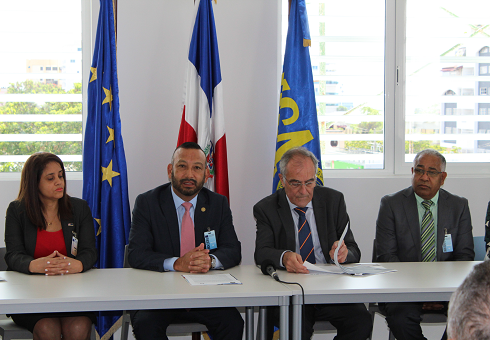The IICA Delegation in the Dominican Republic carried out the official launch of the Dominican Republic Component of the Central American Program for the Integral Management of Coffee Rust (PROCAGICA-RD) on May 10th at the Delegation of the European Union in the Dominican Republic.
The IICA Delegation in the Dominican Republic carried out the official launch of the Dominican Republic Component of the Central American Program for the Integral Management of Coffee Rust (PROCAGICA-RD) on May 10th at the Delegation of the European Union in the Dominican Republic.
The launching activity was attended by the Ambassador of the European Union in the Dominican Republic Mr. Alberto Navarro; Representative of the Ministry of Agriculture Mr. Jeudy Arias; Representative of the Ministry of the Environment and Natural Resources, Ms. Cyntia Ortiz Rojas; Representative of the Dominican Coffee Council (CODOCAFE) Mr. José Fermín Núñez; and on behalf of the General Directorate of Multilateral Cooperation (DIGECOOM), Mrs. Gloria Coste, institutions that will be coordinating and accompanying the project.
The main result of the project is to support at least 1,000 small coffee producers in seven provinces: Santiago Rodríguez, Dajabón, Elías Piña, Azua, San Juan de la Maguana, Independencia and Bahoruco, improving their resilience capacity against eventual adverse conditions of climate change.
The project consists of three components: 1) Transfer of technologies to producers and producers; 2) Implementation of an Early Warning System for the proper management of pests and market information; and 3) Strengthening of producer and producer organizations and institutions linked to the coffee sector. The beneficiaries of the project are organized coffee producers, coffee producers’ organizations, and local and national institutions working on the coffee theme.
For the execution of the activities, a Project Coordinating Unit has been set up and an Operational Plan for the year 2017 is already in execution. This plan contemplates to make an initial diagnosis of the situation of the territories benefited by the project, the production systems of the organizations and institutions in the area of influence of the project. At the same time, it is planned to support the production of coffee in the renovation of old and deteriorated coffee plantations, the maintenance of coffee plantations already in production and to improve the diversification of coffee production systems. In addition to these actions, the training of field technicians will be used to improve their technical capacities when assisting producers and will evaluate the Early Warning Systems for proper pest management and market information with the purpose of complementing and strengthening these important areas of action of the coffee sector.











